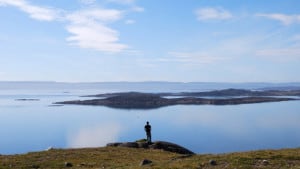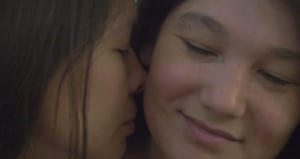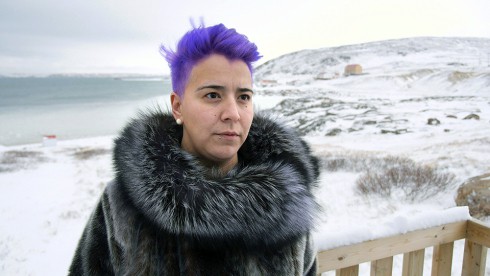What is it like being gay in Iqaluit? Against the backdrop of the preparations for a seminal Pride celebration in Nunavut, this thoughtful documentary looks at the challenges faced by LGBTQ Inuit and how a new generation is forging a more inclusive society.
Take a beautiful trip with filmmakers Mark Kenneth Woods and Mike Yerxa and learn about life in Canada’s north. Two Soft Things, Two Hard Things screens Friday, June 3 at TIFF Bell Lightbox.
What is the origin story of this doc?
Mike: Mark and I had worked on a previous documentary project for OUTtv regarding LGBT trailblazers in Canadian sports. We were hoping to work together again and both had read an Xtra article about a fascinating Pride party that was happening in Iqaluit in the fall of 2014. In the summer of 2015, we reached out to the organizers of Iqaluit Pride to see if another event or party was happening. They had plans for a fall event and we thought it would be a prime opportunity to not only document the event but also investigate LGBT identities in Nunavut and Inuit culture. We decided to make the film because we felt that the story was really untold and that a community of individuals wanted their voices to be heard. We shot the film over four days in Iqaluit and one afternoon in Ottawa.
When friends ask about your time in Nunavut, how do you usually describe it?
Mark: I often find myself describing my experience in Nunavut using an unexpected word: Warm. Not in temperature obviously, as we filmed during a blizzard in October, but warm describes the community perfectly. While there may have been some initial hesitation in talking to us (and rightfully so, when two Southerners show up to make a documentary about the north), people were so quick to help out. From organizing interviews to offering food to driving us around town, there was so much kindness. I feel like everyone we talked to was also part of the crew in some way. I’d go back in a heartbeat if it weren’t so insanely expensive.

What is the message you most want to share with the rest of Canada?
Mike: I think the message of the film is that there is a lot of healing that needs to occur in this part of the world. There is a significant amount of cultural shame (which directly affects sexual and gender identity), a deep sadness and tremendous work that needs to be done. That being said, there are many individuals, Inuit and non, who are working very hard to reclaim what was lost and what was taken from them. Growing up in Canada, we learned very little in school of the north and of the government programs and residential schools. I think we all must do better to know our history and make steps to right some of our nation’s darkest moments.
Did you have a moment while making Two Soft Things, Two Hard Things that altered your perspective?
Mark: There were so many moments that profoundly affected me, but I think there was one in particular that stood out. During our interview with former MP and MLA Jack Anawak, we asked him where he thought the current disdain some locals have towards LGBTQ people came from. He began to explain that, as young boys, they were sexually abused in residential schools by clergymen and that was their experience with the concept of homosexuality. That horrible association has stuck around. I was all too aware of the abuse that happened in church-administered residential schools and it’s absolutely horrific.
What really got to me though was that he said it in such a casual way. It really sunk in how common this was for his generation growing up, and I was fighting back tears. At the same time, I was furious. In present day Nunavut, there is still that tendency for some religious folk to blame homosexuality for the sexual abuse at residential schools while completely ignoring the fact that this abuse was at the hands of their own clergy and church-administered institutions. It’s a complicated and painful discussion to have, but it was such a powerful example of how the effects of colonization continue in the present.
What is the greatest lesson you learned while making this doc?
Mike: There were so many incredible takeaways from making this film. We learned that sexuality and gender are very complex issues across every culture. I didn’t know how complex throwing a simple Pride event could be for the community of Iqaluit. Mark and I thought we’d go and film a documentary about a very unique event; however, it quickly turned into a film about colonization, Christianity, cultural shame, survival and reclaiming.
One of my favourite quotes from the film was care of Alethea Arnaquq-Baril when she says that for Inuit, emotions are felt just as strongly but expressed a lot more subtly. This gave me a great sense of who these people are. These are tremendously passionate individuals. They care a great deal for their families, culture and community. They are also survivors who have lived in the harshest conditions of the world for thousands of years. It was an honour to get to know many individuals and to have their stories told.
What did Two Soft Things, Two Hard Things teach you about yourself?
Mark: The experience really humbled me. My ego took a hit in the best way possible. Even during our initial development stage, I was overcome with embarrassment. I like to think of myself as educated, well travelled and fairly knowledgeable about world issues, yet here I was learning about the heinous past of my own country for the first time. Why didn’t I learn this in school? How did I not already know this?
I learned that, just like the many diverse sexual identities and practices that have been erased from history, so too have many of the practices of the Inuit. I learned that I only know half-truths about my own country. I learned to listen better. And when it comes to Aboriginal issues in this country, listening is something we could all do a little better.
Two Soft Things, Two Hard Things screens Friday, June 3 at TIFF Bell Lightbox.





 Follow Us On Instagram
Follow Us On Instagram
